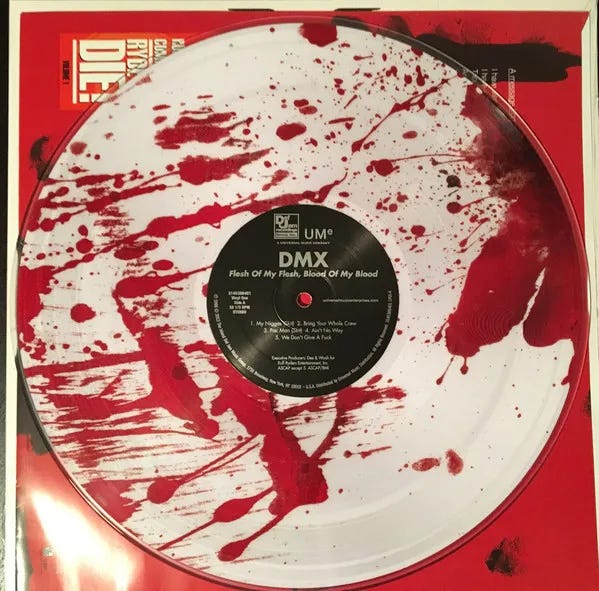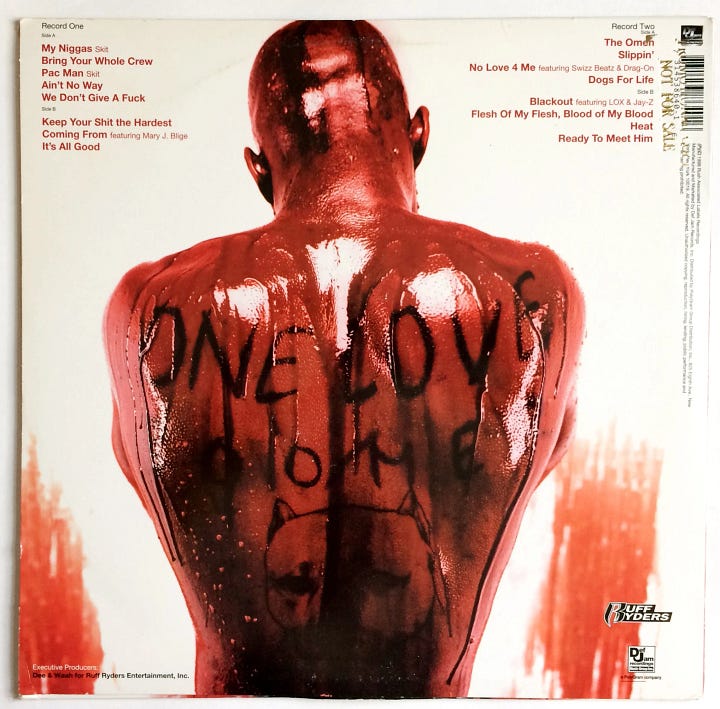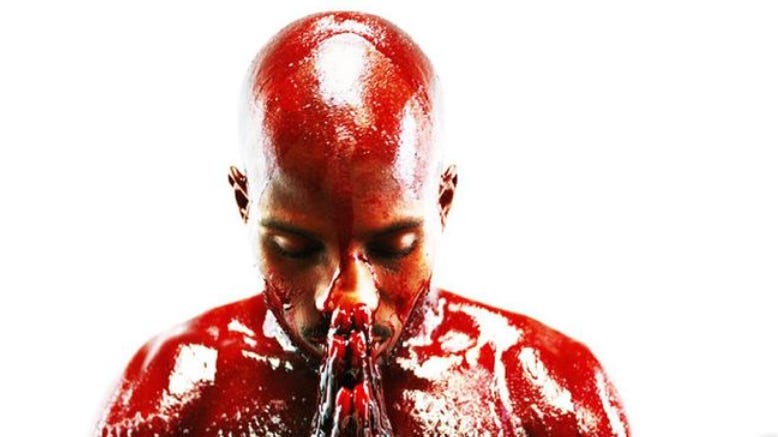The Horror in DMX’s “Flesh of My Flesh, Blood of My Blood" Album Cover
Blood, Sweat, and Hip-Hop:
If the sight of blood makes you squeamish, do not read…
We might think that hip-hop and horror make an odd pairing, but some album covers capture the genre’s darker energy, reaching far beyond the music itself. One striking example is DMX’s 1998 album Flesh of My Flesh, Blood of My Blood. The cover immerses us in a world of horror—not just hinting at it but daring us to confront the struggles and battles that shaped both his life and career.
A Revelation Drenched in Blood
On the cover of Flesh of My Flesh, Blood of My Blood, DMX appears covered in blood, staring directly at the viewer with a gaze that combines defiance and despair. This image isn’t designed for mere spectacle; it’s a visual manifesto of the pain DMX poured into his music—a journey of sacrifice and survival. The blood serves as more than a violent symbol; it embodies his internal battles, the scars of his past, and the burdens he carried. Released at the peak of his career, the cover art strips away any semblance of glamour, presenting an artist unafraid to expose his wounds.
DMX Flesh Of My Flesh 1998 Album Cover shot by Jonathan Mannion. Photographer Jonathan Mannion said, “Though having X bathed in a pool of blood seemed to be a no-brainer, given the album’s unforgettable title.”
“Flesh of My Flesh, Blood of My Blood, I was given total free reign. I conceptualized the entire shoot, I spent days and days and days researching, looking at books about African voodoo and color theory, why red is an intense color and why white is a calming color,” Mannion recalled. “I had 60 gallons of blood in a bathtub and I was like, ‘Now my challenge is getting DMX in this blood and what am I gonna do to get him in there.’ He’s looking at the tub, and I’m looking at him, and he’s looking back at me, and he’s like, ‘You want me to get in it?’ I was like, ‘Yeah, that’s how it’s gonna happen today.'”
He continued, “He was like, ‘Aw man dawg, I’m not going to get in it because man, I don’t know if it’s right. I’ve got these new pants on…’ – I was like, dawg, are you really going to use the pants excuse to not get in there? I was like, ‘Here, why don’t you just wear my pants?’ and I dropped my pants in front of a studio of 20 people. Everybody’s looking at me like I’m totally insane, but it showed how much I believed in my work, and he couldn’t deny it…so he got in. I had chills the entire time I was shooting. And we had an incredible day and made amazing pictures."
The terror here doesn’t rely on supernatural creatures or fictional nightmares. Instead, it reflects the harsh realities of life—depression, addiction, and the constant search for redemption. For DMX, who emerged from an environment as unforgiving as the streets he rapped about, the blood becomes a vivid metaphor for his unhealed emotional wounds. It’s a reminder that horror in hip-hop isn't a seasonal indulgence—it’s a central element of the gritty survival stories that define the genre.
The Dark Themes Within the Music


The essence of Flesh of My Flesh, Blood of My Blood, goes beyond its cover art. Within the tracks, DMX dives deep into the struggles that haunted him—internal turmoil, spiritual warfare, and the weight of his traumas. His lyrics take listeners on a journey through the darkness, grappling with demons and confronting evil forces. The blood-soaked cover sets the stage for a raw, unflinching look at a man wrestling with himself. Here, horror doesn’t just embellish the storytelling—it becomes a reflection of the brutal truths that shaped DMX's experiences.
The Importance of Horror in Hip-Hop
Horror in hip-hop isn’t just for shock value—it’s a way for artists to make you feel the weight of their stories. In a genre that thrives on truth-telling, horror becomes a tool to dive deep into fear, trauma, and survival. It reflects the real-life nightmares many face—systemic violence, addiction, mental health struggles—turning personal pain into art.
Albums like DMX’s Flesh of My Flesh, Blood of My Blood show that horror isn’t just about creepy creatures or the supernatural; it’s about the battles we fight within ourselves and in the world around us. Through unsettling imagery and haunting themes, hip-hop artists connect with emotions too raw for words alone, blurring the lines between horror and reality. It’s not just music—it’s a way to release what’s buried, giving listeners permission to face their demons while vibing to the beat.
Horror That Resonates with Society
DMX’s album cover isn’t just a moment in hip-hop history; it’s a bold statement that challenges our perceptions of horror within music. It isn’t about ghosts or ghouls; it’s about facing the terrors of everyday life—survival, struggle, and the wounds that never heal. The blood on this cover carries a weight that is both symbolic and real, making Flesh of My Flesh, Blood of My Blood, a haunting piece of art in the landscape of hip-hop.
For more explorations into the darker side of Black culture, check out my “31 Days of Black Horror” list. This list is the perfect companion to dive into the chilling stories and complex narratives that resonate with the Black experience.
Thank you for reading!
Until next time…
Stay bold, stay brilliant, and remember, as Jay-Z says, "You could be anywhere in the world, but you're here with me. I appreciate that!"
With love and creativity,
Shadé







One of my favorite covers shot by Jonathan Mannion!
“It isn’t about ghosts or ghouls; it’s about facing the terrors of everyday life—survival, struggle, and the wounds that never heal.”
Makes sense that the song “Slippin’” is on this album rather than DMX’s debut because it perfectly captures this ethos that you’ve eloquently described. Another great piece 👍🏾